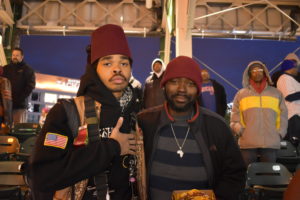December 19, 2019
Block Club Chicago: ‘If We Don’t Remember Them, Who Will?’ : Service Honors Those Who Died While Homeless in Chicago This Year
“We’re the most vulnerable people in the city and nobody thinks about us and then we die. … Somebody has to represent that population and remember them.”
By Helena Duncan
WEST LOOP — On a frigid Tuesday evening, activists, parishioners and people experiencing homelessness filled the pews of Old St. Patrick’s Church in the West Loop.
It was the ninth Chicago Annual Homeless Persons’ Memorial, a collaboration among the Chicago Coalition for the Homeless, Franciscan Outreach, the Ignatian Spirituality Project, Old St. Patrick’s Church and the musical nonprofit Harmony, Hope & Healing.
The service honors the lives of those who died in Chicago this year while experiencing homelessness. Sixty-six names were printed in this year’s bulletin, along with “those whose names are known only to God.”
Keith Freeman, senior organizer for the Coalition for the Homeless, helped compile the list of people who had died while homeless in 2019 by speaking with shelters, homeless services providers, family members and friends.
“We’re the most vulnerable people in the city and nobody thinks about us and then we die,” said Freeman, who was formerly homeless. “They still don’t think about us. So somebody has to represent that population and remember them because they were great people.” …
… Leanna Majors clapped and sang along to the music and filmed parts of the service on her phone. Her reason for attending was simple: “To remember the homeless that have passed on is really important. If we don’t remember them, who will?”
The service was also a call to action. Freeman echoed Harris’ message, saying people who want to help the homeless must become politically involved by contacting elected officials to “move different campaigns and proposals forward to help increase funding and resources for the homeless population.”
The Bring Chicago Home campaign, backed by the Chicago Coalition for the Homeless, is one such proposal, calling for a dedicated revenue stream to reduce homelessness and build more affordable housing by raising the city’s real estate transfer tax on the sale of high-end homes…
Link to the full report
December 17, 2019
ABC7 Chicago: Chicago homeless living in Uptown tent city say city has targeted them for years
By Evelyn Holmes
CHICAGO (WLS) — Residents of the tent city underneath the viaduct at Wilson Avenue and Lake Shore Drive in Uptown say the city of Chicago has tried to kick them out for years, but they’re not moving without a fight.
Members of that homeless community said no one wants to live on the street; they only do because they have to, and they need safe, affordable housing in order to get off the streets. Now those residents say they may now have one less concern after the U.S. Supreme Court refused to consider whether state and local governments can make it a crime for people to sleep outside.
“It’s not a crime to live in a tent,’ said Thomas Gordon, Uptown tent city mayor. “It’s not a crime to be homeless. But you come out and harass us all the time.”
Although the 9th Circuit Court decision affects states out west, Patricia Nix-Hodes with the Chicago Coalition for the Homeless said the court’s decision has reach, and is both a victory and an opportunity.
“So it doesn’t necessarily address every single thing that a city might do that would harass someone who is homeless, but I think the concept, the analysis, does apply,” she said.
The people who live under the Uptown viaduct said their presence has been disputed for years. They accused the city of illegally targeting the homeless for removal, but city officials said while being homeless isn’t a crime there has to be a balance between the rights of the homeless and the community.
“So we do come in and we clean because it’s healthy for the participants who are living there to be in a clean environment,” said Alisa Rodriguez, deputy commissioner for the Department of Family and Support Services.
While city officials said they’ve always maintained a commitment to respecting the rights of this vulnerable population, homeless advocates like Joseph Peery said what’s needed is more affordable housing.
“If your only crime is you’re poor, that’s no crime,” he said.
Link to the full report & video
November 13, 2019
Block Club Chicago: ‘It’s going to be a long winter’: As Chicago’s homeless navigate extreme cold, advocacy group urges city to do more
By Mina Bloom
AVONDALE — On Monday, which saw record-breaking low temperatures, Lisa Johnson was bundled up in two shirts, two sweatshirts, three pairs of pants and two jackets.
Johnson lives underneath the viaduct at Belmont Avenue and the Kennedy Expressway along with about a dozen other people experiencing homelessness. She said she’s been “thinking a lot lately” about what this winter has in store for her.
“I do worry. October it snowed, and it’s so cold already. I keep saying: It’s going to be a long winter,” Johnson said…
…Mary Tarullo, associate director of policy and strategy at Chicago Coalition for the Homeless, said the city isn’t doing enough to keep people like Johnson safe in the extreme cold.
“Homelessness is a problem with a clear solution and that solution is housing,” Tarullo said. “The city is woefully behind when it comes to funding [that housing.]”
Tarullo’s group has been pushing the city to adopt its Bring Chicago Home plan for over a year. The plan calls for raising the real estate transfer tax on high-end home sales and then using that money to fund affordable housing and homeless services…
…Tarullo said hand warmers and hot meals only go so far, especially when a polar vortex hits.
“The city does acknowledge when the temperature drops and that they need to increase their services but without a significant amount of funding to actually give people what they need to survive the winter and to survive year-round, there’s only so much you can do,” she said…
…“We’ve been working on this structural solution — Bring Chicago Home — for over a year now. We’ve been fighting for this with urgency. This solution is within our reach and we need it to happen immediately,” Tarullo said.
“We cannot go another year without a dedicated revenue stream for homelessness in Chicago.”
Link to the full report
November 12, 2019
Reuters: Chicago’s cold blast spells concern for the city’s homeless
By Brendan O’Brien
CHICAGO (Reuters) – Homeless advocates in Chicago were closely monitoring wind chill temperatures on Tuesday as an early season blast of arctic air swept across the eastern two-thirds of the United States.
The city of Chicago, where 86,000 homeless people live, opened its six warming shelters over the last few days as unseasonably cold temperatures dipped into the teens with wind chills into the single digits during the morning, according to the National Weather Service (NWS).
“It’s incredibly concerning that we are experiencing this level of cold this early in the season,” said Doug Schenkelberg, director of the Chicago Coalition for the Homeless…
… About 16,000 people sleep each night on the Chicago streets and shelters, Schenkelberg said. He added that the key to dealing with homelessness in extreme weather conditions ultimately is finding permanent supportive housing for the homeless.
“It’s never an easy time to be homeless regardless of the weather and when you add extreme weather like this into the mix, it makes life that much more difficult for people experiencing it,” he said.
Link to the full report
November 9, 2019
USA Today: Chicago weather – arctic blast to affect more than 80,000 experiencing homelessness
While double-digit temperatures may be balmy by Chicago standards, cold fronts this early in the season could be particularly challenging for the more than 80,000 Chicagoans experiencing homelessness.
By Grace Hauck
A record-breaking cold front is expected to sweep across the U.S. from Sunday into Tuesday, with freezing temperatures stretching as far south as parts of the Gulf Coast.
The National Weather Service is forecasting more than 170 potential record-setting cold high temperatures Monday to Wednesday…
… While double-digit temperatures may be balmy by Chicago standards, cold fronts this early in the season could be particularly challenging for the more than 80,000 Chicagoans experiencing homelessness.
“This type of weather starting this early in the season makes their lives that much more difficult,” said Doug Schenkelberg, director of the advocacy group Chicago Coalition for the Homeless.
Link to the full report
November 5, 2019
Associated Press: Strike-ending deal will shape Chicago schools for years
By Kathleen Foody
Chicago teachers and more than 300,000 students affected by an 11-day strike returned to classrooms Friday amid a tentative agreement that ended the walkout and is expected to shape education in the nation’s third-largest city for the next five years…
…The tentative agreement also includes phased-in hiring of additional staff for the city’s neediest schools. Principals working with other school employees will decide what type of position is needed at their school, including counselors or librarians…
…”I do think this agreement reinforces the symbolic idea that teachers have a critical role to play in ensuring the broader well-being of the students and communities they’re serving,” said John Rogers, a professor of education at the University of California Los Angeles. “That work emerged from the strike stronger.”
The district also agreed to hire staff at schools with high numbers of students who are homeless, dedicated to making sure they are getting services required under federal law.
Enshrining those positions in a labor contract is believed to be a national first, said Patricia Nix-Hodes, director of the Law Project at the Chicago Coalition for the Homeless.
“I think it’s visionary,” she said. “A significant number of students in Chicago Public Schools are dealing with homelessness and housing instability, and you can’t separate that from their education.”..
Link to the full report


